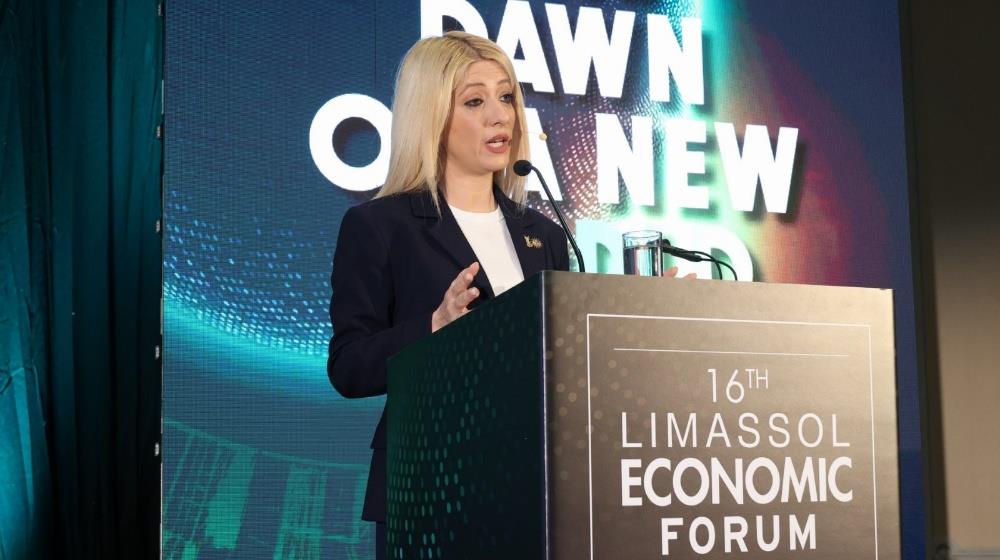Strategic common projects of European interest, such as the Great Sea Interconnector between Cyprus and Greece, are critical and must be pursued, House President Annita Demetriou said addressing the 16th Limassol Economic Forum.
Particularly at a time of uncertainty, weakening strategic partnerships is not an option, she added. “Cyprus will continue to work closely with its European and regional allies to ensure such projects move forward and strengthen regional security.”
Demetriou went on to broach the subject of technological and energy sovereignty. “We should strive to establish a competitive ecosystem that drives innovation and strategic industries with a coordinated investment,” the House Speaker said. “Europe can close the innovation gap and compete or collaborate globally with the U.S. and China.”
Elsewhere, Demetriou said that this year’s focus on reshaping the global order, and Europe’s role within it, could not be more timely. “The world around us is being transformed — by war, fierce economic competition, and technological disruption. Across continents we face aggression, terrorism, and instability: Russia’s invasion of Ukraine; the ongoing war in Europe’s heart; and the devastating consequences of the Hamas attacks. Russia is pursuing increasingly assertive foreign policies, advancing their agendas through political, economic, and military means. Closer to home, instability in the Mediterranean and the Middle East continues to deepen, while the northern part of Cyprus remains under illegal Turkish occupation — a constant reminder that Europe’s security architecture remains incomplete,” she added.
These crises expose Europe’s vulnerabilities but also highlight its responsibility, the House President reasoned. “We live in an era of strategic competition — not only between nations, but between systems and technologies. The race for AI leadership between the United States and China is already shaping the next industrial revolution.”
So, she said, the question is, where will Europe stand in this race?
“Will we remain a regulatory power, or become a global actor that innovates, competes, and leads? The answer must be equally clear: Europe must drive developments, not merely react. Europe must lead.”
Call for heightened security and defence
She referred the European Council recommendation that the EU must take greater responsibility for its own security and be ready to act autonomously — with a comprehensive, 180-degree approach to defence and diplomacy. “The old debate about integration is over; the challenge today is how decisively we act together,” said Demetriou. “Security and defence cannot rest only with EU institutions and political will must come from national capitals — anchored in our shared values, democratic traditions, and political culture.”
There has been progress, according to the Speaker, “The Strategic Compass provides a roadmap for Europe as a security provider; the European Peace Facility enables military support to partners, including Ukraine; and PESCO fosters joint capabilities and readiness,” she pointed out.
In order to play a meaningful global role however, Europe must stand on three interconnected pillars: economic strength, technological leadership, and defence capability, said Demetriou.
The link between prosperity and security
In this light, she continued, closing the competitiveness gap and fully implementing the Single Market should be top priorities. “Under the upcoming Cyprus Presidency, we will push for a modern, forward-looking budget that strengthens industry, secures supply chains, and supports the green and digital transition,” she revealed.
Prosperity and security are two sides of the same coin, said Demetriou. “For decades, Europe has been underinvested in defence and this must change. A strong integrated Single Market for Defence will boost Europe’s industrial base, joint procurement, and innovation. While the ReArm Europe Plan is a major step toward a true European Defence Union, we must back it with political cooperation and long-term investment. And let me clear: No country that violates international law or occupies part of an EU Member State can be a credible partner in shaping Europe’s security.”
The geopolitical side
A Europe that leads must equally project influence beyond its borders, she claimed, adding that enlargement remains the most powerful tool of peace and stability. “Integrating Ukraine, Moldova, and the Western Balkans is an investment in a stronger, safer Europe,” she suggested. Defending Ukraine’s sovereignty means defending the principles that define us, as she said.
“At the same time, Europe must deepen its engagement in the Mediterranean, Africa, and the Middle East, where Russia is expanding her influence,” said Demetriou. “The Global Gateway Strategy is Europe’s flagship tool — a values-based, transparent, and long-term framework for investment and cooperation.”
In this regard, empowering local societies through sustainable development, democracy, and the rule of law is the most effective shield against instability and manipulation, she said. And the EU must also play a stronger role in shaping the future of Gaza, said Demetriou. “As the main donor to the Palestinians, Europe should contribute to reconstruction and be ready to participate in transitional governance after ceasefire — supporting a peaceful, accountable, and secure future for the region.”
Though, as she stressed, no European security architecture can be complete while Cyprus remains divided. “The EU must play a more active role in restarting reunification talks under UN and EU principles. We will wait to see if the election of Tufan Erhürman, as the leader of the Turkish Cypriot community in the recent elections, will offer a new opportunity for the resumption of negotiations for progress towards a just, viable, and mutually acceptable solution -within the agreed framework- securing peace and prosperity within the EU.”
Concluding, the House President said: “Achieving a European Defence Union is the historic task of our generation. NATO remains essential, but Europe must develop its own capabilities. This new stage of integration requires that debates about governance and strategic autonomy must remain open, inclusive, and focused on our collective security and solidarity.
Our goal is clear: Europe must deter aggression, defend its territory, and lead with confidence. This is the essence of European strategic autonomy — and the task we must now turn into reality.”









